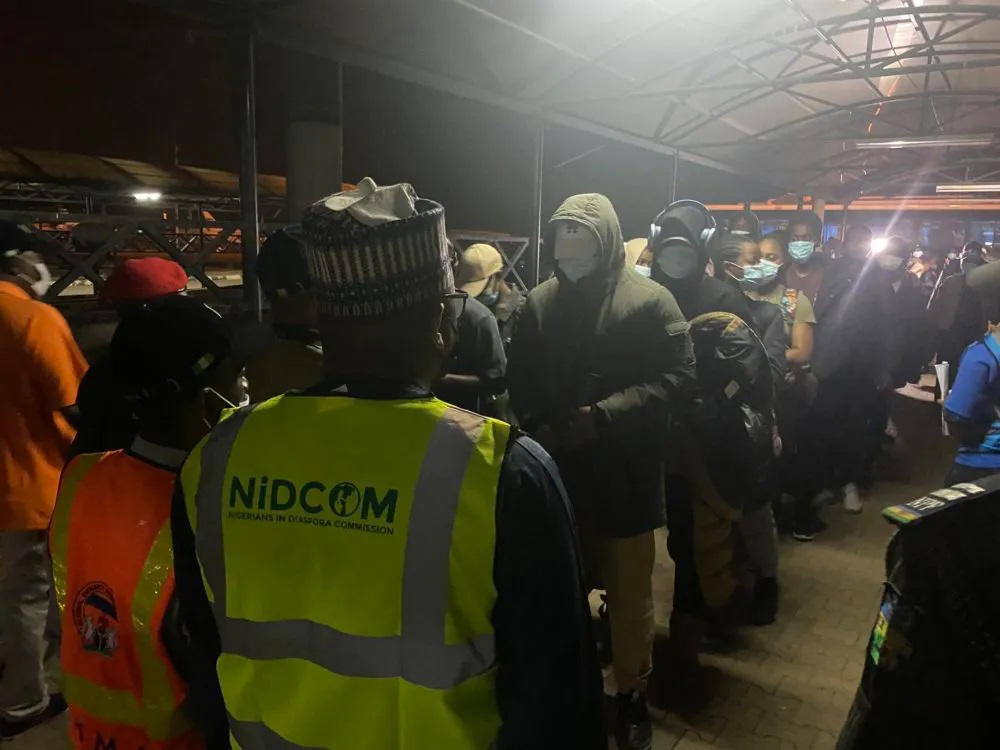•Syrians, Libyans fighting for Russia killed on battlefield, says top Ukrainian official
•Russian oligarch lambasts country’s ‘massacre’
Thirteen (13) out of 19 Nigerians that were detained in various camps in Poland have been released.
Their release followed the intervention of the Nigeria Ambassador to Poland, Major General Christian Ugwu (rtd).

A statement yesterday by Abdur-Rahman Balogun, Head of Media, Public Relations and Protocols Unit Nigerians in Diaspora Commission quoted Ugwu as saying that among the remaining six persons in detention camps, one claimed to be a Cameroonian.
“Unfortunately, the remaining five, all applied for international protection (asylum) in Poland including Igwe Ikechukwu Christian, who had been interviewed by some foreign media.
“ They can not be released until the Government of Poland takes a decision on their application or they decide to withdraw the application”, the envoy added.
The Nigerian Ambassador to Poland assured Nigerians that the Mission will continue to do its best to ensure that the interest of Nigerians are well taken care of, despite the fact that they had been adequately briefed on the likely consequences of remaining as undocumented immigrants in Poland.
It would be recalled that President Muhammad Buhari had in March immediately approved the evacuation of Nigerians mostly students trapped in the Russian- Ukrainian crisis back home.
The directive was swiftly carried out by the inter-ministerial agencies coordinated by the Ministry of Foreign Affairs with over 1600 Nigerians brought back home.
However, some of the Nigerians chose to remain behind and were clamped into detention centres in Poland.
Syrians fighting for Russia killed on battlefield, says top Ukrainian official
A number of Syrians fighting for Russia in Ukraine have been killed on the battlefield, the Ukrainian president’s top security official has said.ADVERTISING
Oleksiy Danilov, Secretary of the National Security and Defence Council of Ukraine, shared photographs that showed three dead fighters in military-style fatigues, with their faces clearly visible, along with a number of other indistinguishable bodies.
He said they were foreign fighters who had been killed in the Luhansk region of eastern Ukraine, where Ukrainian forces are fighting a new Russian offensive.
An aide to Mr Danilov said the fighters were from Syria and Libya.
Mr Danilov, a central figure in Ukraine’s war effort, said he was sure his country would defeat Russia but the speed of the victory would depend on the amount of weapons given by western allies and how quickly they are sent.
Russian oligarch lambasts country’s ‘massacre’
A Russian oligarch has lambasted the country’s “massacre” in Ukraine and called for an end to the “crazy war”.
Oleg Tinkov wrote in a profanity-littered Instagram post that he did not see “any beneficiary” of the conflict.
Mr Tinkov is one of Russia’s most well-known entrepreneurs and founded the global online bank Tinkoff Bank and owned the cycling team Tinkoff-Saxo.
He is also one of the most high profile Russians to publicly condemn President Vladimir Putin’s actions.
Two of the country’s most prominent oligarchs Mikhail Fridman and Oleg Deripaska have made separate calls for peace, but have stopped short of direct criticism.
Mr Tinkov said “90%” of his country’s people were against the war and added “morons in any country are 10%”.
The UK government has sanctioned Mr Tinkov along with many other Russians identified as having close links to the Kremlin, but few have spoken out against their country’s invasion of Ukraine.
Mr Tinkov has previously denied having any close relationship with President Putin or the Kremlin.
In his Instagram post, Mr Tinkov said: “I don’t see a SINGLE beneficiary of this insane war! Innocent people and soldiers are dying.
Number of refugees fleeing Ukraine war exceeds 5m — UN agency
The number of people fleeing Ukraine to escape Russia’s invasion has passed five million in Europe’s worst refugee crisis since the end of World War Two.
The U.N. refugee agency said on Wednesday.
Russia’s invasion has triggered a massive displacement of people in the nearly eight weeks since it began, including more than seven million Ukrainians within the country.
According to the UN data, 5.03 million had fled Ukraine as of Wednesday.
Most of them had crossed to the European Union through border points in Poland, Slovakia, Hungary and Romania where volunteers and governments have scrambled to help mostly women and children refugees find jobs, accommodation and to provide them support.
“When you look at the number of refugees in central Europe, the number is unprecedented,” said Jakub Andrle, the Migration Programme Coordinator at People in Need, a Prague-based aid group operating in Ukraine.
“It is also important to remember that the numbers can increase rapidly from day-to-day depending on the situation on the ground.”
Russia launched what it calls a “special military operation” on Feb. 24 to demilitarise and “denazify” Ukraine.
Kyiv and its Western allies reject that as a false pretext, Russia has denied using banned weapons or targeting civilians.
More than half the refugees have entered the European Union through Poland where many had family and other connections living in the region’s largest pre-war Ukrainian community.
In central and eastern Europe, many residents rushed to the border at the outset of the war, bringing supplies to weary refugees, many of whom endured long and harrowing journeys to safety.
Now the focus has shifted to the longer term as cities reach housing capacity, said People in Need migration programme coordinator Katarina Pleskot Kollarova.
Many remain in temporary housing with families or hotels that need the space for the upcoming tourist season, she added.
“The first response was really good but now governments need to think about the long-term perspective,” said Kollarova, whose group has some 140 people working in Ukraine.
“It is getting difficult for example, to find places in Prague and it is harder to keep big families together.”
VANGUARD






